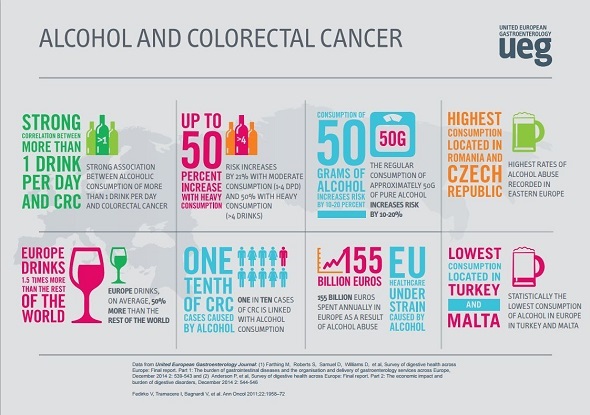Nov 25 2015
Healthcare professionals across Europe are being urged to help reduce the risk of colorectal cancer (CRC) by taking positive action against alcohol misuse and dependence. High levels of alcohol dependence and low levels of treatment have recently been identified in a European primary care study, fuelling the argument that family doctors must play a key role in preventing alcohol-related harm and reducing the incidence of CRC.
“There is a very strong dose-dependent relationship between alcohol consumption and the risk of CRC,” said Professor Matthias Löhr from United European Gastroenterology (UEG). “Primary care teams should be properly supported to identify and treat individuals consuming hazardous levels of alcohol and be vigilant to the signs of CRC in heavy drinkers.”

Alcohol and bowel cancer
The link between alcohol consumption and CRC is now well established. It has been estimated that approximately one in 10 cases of CRC is associated with alcohol consumption, and the risk increases in a dose-dependent manner. A recent meta-analysis found the risk of CRC increased by 21% with moderate alcohol consumption (>1–4 drinks/day, equivalent to 12.6–49.9 g/day ethanol) and by >50% with heavy drinking (≥4 drinks per day, equivalent to ≥50 g/day ethanol). Even having one alcoholic drink a day (10 g/day ethanol) increases the CRC risk by 7%.
“As healthcare professionals, we need to educate our patients about the dangers of drinking too much alcohol, but we also need to intervene early when we suspect an individual is drinking too much and factor alcohol consumption into our CRC risk assessments.”
Alcohol dependence
Alcohol dependence is highly prevalent in the EU. In a recently-reported study involving six European countries, the 12-month prevalence of alcohol dependence in primary care was almost 9%. Treatment rates were low, with only 22% of those diagnosed having previously sought and received professional help. The European arm of the World Health Organization estimates that only one in 20 of those with hazardous or harmful alcohol use are identified and offered advice by a primary care provider and that less than one in 20 with a diagnosis of alcohol dependence have seen a specialist for treatment.
“Given that there is compelling evidence that that both pharmacological and psychological approaches can effectively reduce alcohol consumption, it is disappointing to see such low levels of professional intervention in these studies,” said Prof. Löhr.
“If we are going to have any impact on the incidence of CRC and other cancers in Europe, we have got to tackle the root of its causes.”